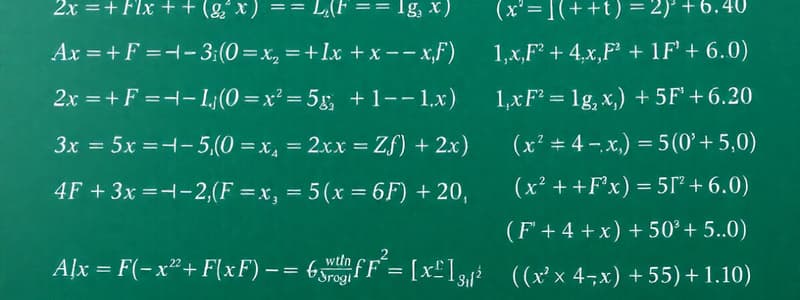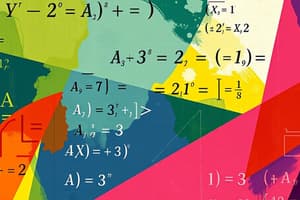Podcast
Questions and Answers
What is the primary goal when solving an equation?
What is the primary goal when solving an equation?
- To isolate the variable on one side (correct)
- To multiply both sides by the same number
- To simplify the equation before solving
- To add constants on both sides
Which of the following represents a linear equation?
Which of the following represents a linear equation?
- 2x - y = 7
- x^2 + 3x + 2 = 0
- y = 4 + 2x^2
- 3x + 5 = 0 (correct)
What is the degree of the polynomial 4x^3 - 3x^2 + 2?
What is the degree of the polynomial 4x^3 - 3x^2 + 2?
- 0
- 1
- 3 (correct)
- 2
Which method can be used to solve a system of linear equations?
Which method can be used to solve a system of linear equations?
In the slope-intercept form of a linear equation, what does 'm' represent?
In the slope-intercept form of a linear equation, what does 'm' represent?
Which of the following is true about systems of linear equations with parallel lines?
Which of the following is true about systems of linear equations with parallel lines?
What is a polynomial?
What is a polynomial?
Which of the following expressions can be factored using the difference of squares method?
Which of the following expressions can be factored using the difference of squares method?
What does the order of operations acronym PEMDAS stand for?
What does the order of operations acronym PEMDAS stand for?
What does it mean to simplify an expression?
What does it mean to simplify an expression?
What is the result of $x^0$ for any non-zero value of x?
What is the result of $x^0$ for any non-zero value of x?
Which of the following expressions represents a quadratic equation?
Which of the following expressions represents a quadratic equation?
What is the domain of the function f(x) = √(x - 4)?
What is the domain of the function f(x) = √(x - 4)?
How can the quadratic equation $2x^2 - 4x + 2 = 0$ be solved by factoring?
How can the quadratic equation $2x^2 - 4x + 2 = 0$ be solved by factoring?
What is the correct expression for the quadratic formula?
What is the correct expression for the quadratic formula?
If f(x) = 3x^2 + 2x - 1, what is f(1)?
If f(x) = 3x^2 + 2x - 1, what is f(1)?
Which property describes a function where each input has exactly one output?
Which property describes a function where each input has exactly one output?
What does the term 'range' of a function refer to?
What does the term 'range' of a function refer to?
What does negative exponent signify?
What does negative exponent signify?
Which of the following functions is NOT a polynomial function?
Which of the following functions is NOT a polynomial function?
Flashcards
Algebra
Algebra
A branch of math that uses symbols to represent numbers and their relationships.
Variable
Variable
A symbol that represents an unknown value (like x, y, or z).
Linear Equation
Linear Equation
An equation that graphs as a straight line (like y = 2x + 5).
Solving an Equation
Solving an Equation
Signup and view all the flashcards
Polynomial
Polynomial
Signup and view all the flashcards
Order of Operations
Order of Operations
Signup and view all the flashcards
System of Equations
System of Equations
Signup and view all the flashcards
Equation
Equation
Signup and view all the flashcards
Constant
Constant
Signup and view all the flashcards
Slope-intercept form
Slope-intercept form
Signup and view all the flashcards
Quadratic Trinomial
Quadratic Trinomial
Signup and view all the flashcards
Exponent
Exponent
Signup and view all the flashcards
Negative Exponent
Negative Exponent
Signup and view all the flashcards
Zero Exponent
Zero Exponent
Signup and view all the flashcards
Radical
Radical
Signup and view all the flashcards
Quadratic Equation
Quadratic Equation
Signup and view all the flashcards
Function
Function
Signup and view all the flashcards
Domain
Domain
Signup and view all the flashcards
Range
Range
Signup and view all the flashcards
Quadratic Formula
Quadratic Formula
Signup and view all the flashcards
Study Notes
Basic Algebraic Concepts
- Algebra is a branch of mathematics that uses symbols to represent numbers and relationships between them.
- Variables: Symbols (like x, y, or z) that represent unknown values.
- Constants: Symbols that represent fixed values.
- Expressions: Combinations of variables, constants, and operations (like addition, subtraction, multiplication, division).
- Equations: Statements that show that two expressions are equal. They contain an equals sign.
Solving Basic Equations
- The goal in solving an equation is to isolate the variable on one side of the equation.
- To isolate a variable, perform inverse operations on both sides of the equation (e.g., addition and subtraction, multiplication and division).
- Order of Operations (PEMDAS/BODMAS): Parentheses/Brackets, Exponents/Orders, Multiplication and Division (left to right), Addition and Subtraction (left to right). This order is crucial for evaluating expressions correctly.
- Simplifying expressions is very important before solving equations.
Linear Equations
- A linear equation is an equation that can be written in the form ax + b = 0, where a and b are constants, and x is a variable.
- The graph of a linear equation is a straight line.
- Slope-intercept form: y = mx + b, where m is the slope and b is the y-intercept.
- Point-slope form: y - y₁ = m(x - x₁), where m is the slope and (x₁, y₁) is a point on the line.
Systems of Linear Equations
- A system of linear equations is a set of two or more linear equations with the same variables.
- Solutions to systems of linear equations can be found using various methods (e.g., substitution, elimination, graphing).
- A system can have one solution (intersecting lines), no solution (parallel lines), or infinitely many solutions (coincident lines).
Polynomials
- Polynomials are algebraic expressions consisting of variables and coefficients, involving only the operations of addition, subtraction, multiplication, and non-negative integer exponents.
- Terms in a polynomial are separated by plus or minus signs.
- Degree of a polynomial: The highest power of the variable in any term in a polynomial.
Factoring Polynomials
- Factoring a polynomial means expressing it as a product of simpler polynomials.
- Common Factoring: Identify and factor out common factors from all terms.
- Grouping: Group terms in the polynomial and factor out common terms in each group.
- Difference of Squares: Factoring expressions in the form (x² - y²).
- Quadratic Trinomials: Factoring quadratic expressions in the form ax² + bx + c.
Exponents and Radicals
- Exponents represent repeated multiplication (e.g., x³ = x · x · x).
- Negative exponents mean reciprocals.
- Zero exponents always equal 1.
- Radicals represent roots of numbers (e.g., √x represents the square root of x).
- Laws of exponents and radicals are crucial for calculations.
Quadratic Equations
- Quadratic equations are equations in the form ax² + bx + c = 0, where a, b, and c are constants.
- Solving quadratic equations using factoring, completing the square, and the quadratic formula.
- The quadratic formula: x = (-b ± √(b² - 4ac)) / 2a
Functions
- A function is a special type of relation where each input has only one output.
- Domain: The set of all possible input values (x-values).
- Range: The set of all possible output values (y-values).
- Function notation: f(x) represents the output of the function for a given input x.
- Linear, quadratic, and polynomial functions are part of this concept.
Studying That Suits You
Use AI to generate personalized quizzes and flashcards to suit your learning preferences.




